YAKULT FUCOIDAN
In Japan, seaweed has been used as food since prehistoric times. Recently, because of the increasing health consciousness regarding food, polysaccharides, which are components of seaweed, have been gaining attention. Mozuku (a type of brown algae) contains large amounts of fucoidan, which is a polysaccharide mainly composed of fucose, and contains uronic acid and a small amount of xylose. Additionally, fucose is partially bound to sulfate groups, which gives it its viscous properties.
What is Yakult Fucoidan?
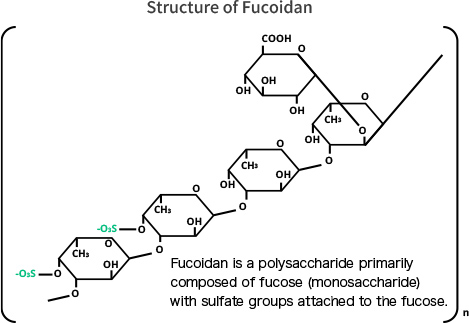
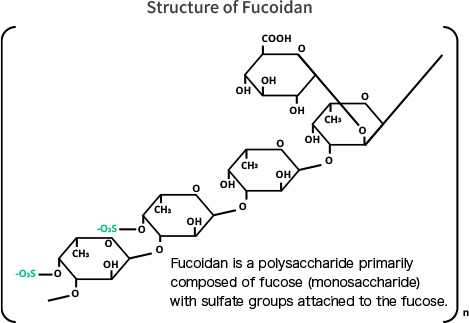
At Yakult, we focused on and advanced research and development of fucoidan derived from Okinawan mozuku seaweed. As a result, we have confirmed that the main component fucoidan obtained through our unique manufacturing method has excellent physiological effects, such as improving non-specific stomach complaints and reducing H. pylori bacteria, which is known to be deeply involved in gastric diseases.
Yakult Fucoidan uniformly distributes the mineral components within the fucoidan, allowing for consistent effects on the stomach. Furthermore, by standardizing the molecular weight size (50,000–100,000), viscosity is reduced, making it easier to handle as a raw material.
Yakult Fucoidan is available for use as a health-oriented food ingredient.
Features of Yakult Fucoidan
1Improvement of Nonspecific Complaints
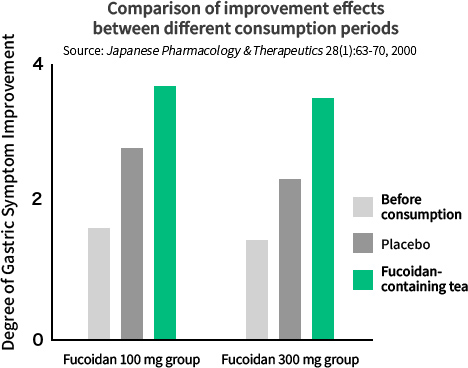
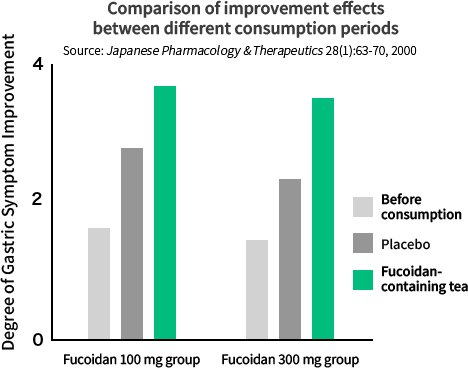
When 10 patients with nonspecific complaints consumed fucoidan-containing tea for 14 days, their gastric symptoms showed clear improvement compared to before consumption. This effect is believed to be due to the promotion of gastric motility.
2Helicobacter pylori Suppressive Effect
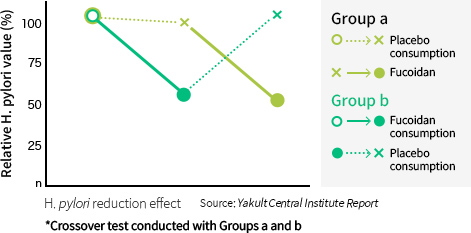
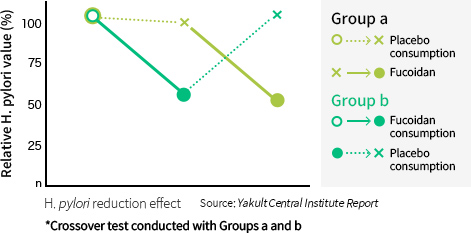
When 11 H. pylori-positive subjects consumed fucoidan-containing tea (100 mg/day) for 10 days, their H. pylori bacterial count decreased by approximately half. The consumption of fucoidan is expected to have a reducing effect on H. pylori bacteria.
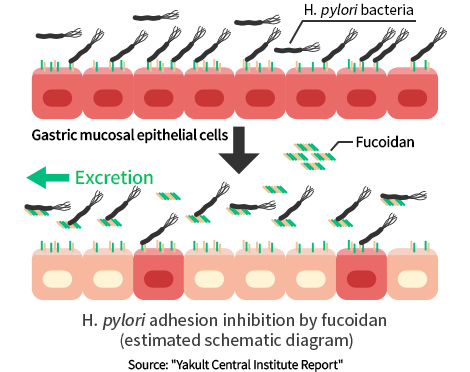
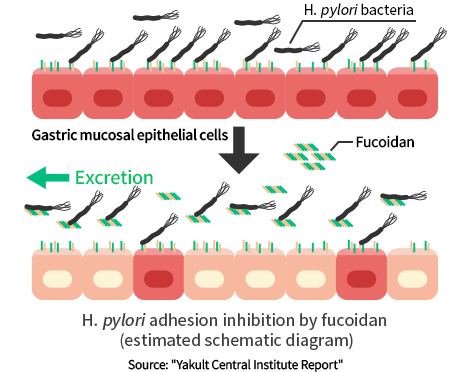
H. pylori bacteria adhere to sugars (such as fucose) on the surface of gastric epithelial cells. Fucoidan, which contains fucose as a component, can competitively inhibit H. pylori's adhesion to gastric epithelial cells. (Demonstrated at in vitro level).
3Manufacturing Method of Yakult Fucoidan


Fucoidan extracted from Okinawan Mozuku shows wide variations in anti-ulcer activity.
Through our unique manufacturing method, ion exchange treatment is applied to convert fucoidan's sulfate ester groups into free acid and alkali metal salt forms.
Successfully reduced variations in anti-ulcer activity.
Yakult Fucoidan Specifications and Other Information
1Yakult Fucoidan Specifications
| Item | Specification |
|---|---|
| Appearance | Brown powder |
| Fucoidan content | Not less than 80% |
| Water content | Not more than 10% |
| Packaging | Cardboard box (1 kg [500 g × 2 bags]) |
| Shelf life | 3 years from manufacturing date |
2Yakult Fucoidan Safety
Safety has been confirmed through acute toxicity tests, subacute toxicity tests, chronic toxicity tests, and mutagenicity tests.
3List of References
- ・H.Shibata,et al.:Anti-ulcer Effect of Fucoidan from Brown Seaweed, Cladosiphon okamuranus TOKIDA in Rats.Japanese Pharmacology and Therapeutics 26(8):37-41,1998
- ・M.Nagaoka,et al. : Structural study of fucoidan from Cladosiphon okamuranus TOKIDA. Glycoconjugate Journal 16 : 19-26,1999
- ・Hideyuki.Shibata : Inhibitory Effect of Cladosiphon fucoidan on the Adhesion of Helicobacter pylori to Human Gastiric Cells.
Jo urnal of Nutritional Science and Vitaminology 45(3) : 325-336. 1999 - ・Y Yamamoto,et al.:Effect of Fucoidan and Fucoidan Containing Tea on Gastric Ulcer and Non-ulcer Dyspepsia.Japanese Pharmacology and Therapeutics 28(1):63-70,2000
- ・T Suzuki,et al.:Experience with Intravenous Bolus Injection of Iopamidol for Helical Computed Tomography(CT).Japanese Pharmacology and Therapeutics 28(11):931-935,2000
- ・Y Yamamoto,et al.:Effect of Fucoidan Containing Tea on the Eradication of H.pylori and Non-ulcer Dyspepsia.Japanese Pharmacology and Therapeutics 28(11):937-942,2000
- ・H.Shibata,et al.:Properties of fucoidan from Cladosiphon okamuranus tokida in gastric mucosal protection.
BioFactors 11:235-245,2000 - ・Hideyuki.Shibata,et al.:Effect of oligofucose derivatives on acetic acid-induced
gastric ulcer in rats.
Bio-Medical Materials and Engineering 11:55-61,2001 - ・I.Kimura-Takagi,et al.:Determination of glucuronic acid containing fucoidan from liquid chromatography with pre-column fluorescence derivatization.Chromatography 22(2):85-90,2001
- ・T.Sone,et al.:Anti-inflammatiory effect of Cladosiphon okamuranus TOKIDA extract.Fragrance Journal(12):87-92,2001
- ・Y.Yamamoto,et al.:Effect of Fucoidan-containing Tea on Non-ulcer Dyspepsia.Japanese Pharmacology and Therapeutics 30(5) : 397-400,2002
- ・M.Nagaoka,et al.:Effect of fucoidan from Cladosiphon okamuranus and Bifidobacterium bifidum strain Yakult on the eradication of Helicobacter pylori.The Journal of the Japanese Society of Clinical Studies on Intestinal Microflora 4-5(1):57-61,2002-2003
- ・H.Shibata,et al,:Preventive Effects of Cladosiphon Fucoidan Against Helicobacter
pylori Infection in Mongolian gerbils.
Helicobacter 8(1) : 59-65,2003 - ・Yoshinobu Aisa,et al, : Fucoidan induces Apoptosis of Human HS-Sultan Cells
Accompanied by Activation of Caspase-3 and Down-Regulation of ERK Pathways
American Journal of Hematology 78 : 7-14,2005
